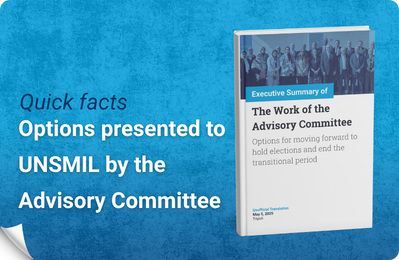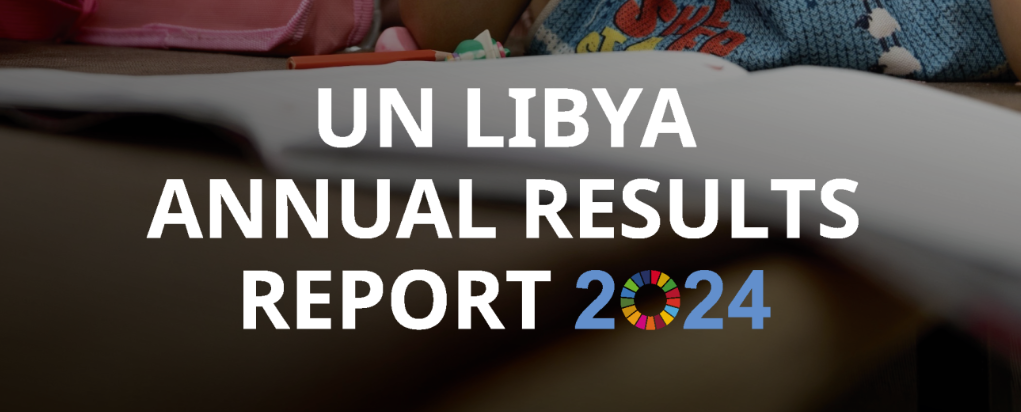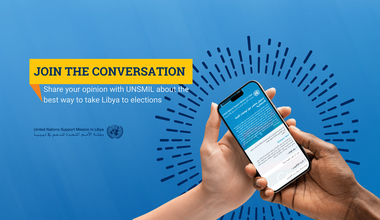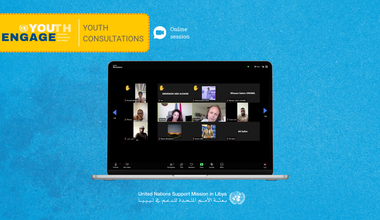Near verbatim transcript of virtual Press Conference of the Acting Special Representative of the Secretary-General and Head of UNSMIL with UN in Geneva Correspondents
United Nations Information Service in Geneva - 23 April 2020
Alessandra Vellucci, Director of the United Nations Information Service in Geneva and moderator: Good morning everybody, thank you for being with us for this press conference on the latest development in Libya and the work of the UN in the current Libyan context. We have the great pleasure to have with us Stephanie Turco Williams, Acting Special Representative of the Secretary-General and Head of the United Nations Support Mission in Libya (UNSMIL).
The Acting Special Representative: Good morning everyone, I wish that we could meet in person, but as you know, circumstances are preventing that and I hope to see you all again very soon, as soon as we can get back to Geneva and resume the three Libyan tracks. I will provide a brief topper.
I am sorry to report that I have a very bleak assessment right now of the situation in Libya. What we have now is a perfect storm, an ongoing, in fact, escalating conflict that is directly being fuelled by external parties - it is really now much more of a burgeoning proxy war. We have divided institutions, dysfunction, corruption, a struggling economy, no oil revenues or very few oil revenues coming in. Since the blockade was imposed around mid-January, the country has lost $ 4 billion at least in oil revenues. And finally, last but not least, we have a pandemic, a corona pandemic which is stretching an already decimated health infrastructure, health system.
We have the UN, UNSMIL and the humanitarian agencies on the ground in Libya, delivering in these very difficult circumstances, delivering to the Libyan people and working with the local authorities across the country. WHO is working with the national centres for disease control. These are extraordinary circumstances, extraordinary times.
We are at the beginning of the holy month of Ramadan; the Secretary-General has sent out his Ramadan greetings and has reiterated his call for a ceasefire, for an end to the conflicts throughout the region. He obviously had a global ceasefire call in conjunction with the COVID pandemic, which was echoed by many Member States and regional organizations. Unfortunately, that call has thus far been ignored. We hope that with the beginning of Ramadan, the parties to the conflict and their external sponsors will pause and reconsider their decision to continue fighting in the midst of this devastating global pandemic, implications of which for Libya are immense.
With that, I am happy to provide an update on where we are with regard to the Berlin process, to the three tracks, to the international follow-up and associated working groups.
Alessandra Vellucci, Director of the United Nations Information Service in Geneva and moderator: Thank you very much Stephanie for these introductory remarks. Indeed, as you mentioned, the Secretary-General has sent out the message for Ramadan, we have sent it to journalists. If you have not received, let us know.
Question: Good morning. Stefanie, if you just can elaborate on the situation now in the western coast of Libya, the fighting and so on.
The Acting Special Representative: The conflict continues. Last week, we have had the GNA offensive to take the six coastal cities, including Surman, Sabratha and Al-Ajilat. We saw an attempt to take the Woutia Air Base. We are, of course, monitoring that situation in western coastal cities very carefully.
Two comments: one is, there is relative calm on the ground now. We have concerning reports coming out of Surman and Sabratha about retributions, acts of revenge, burning of houses, and we also have, obviously, the reports on the prison break and the release of some potentially very alarming figures, people who have been involved in the human trafficking, fuels smuggling and other violent crimes. We have urged the authorities to take a handle on this issue.
All this being said about the western coastal cities, there is also intensified and some of the worst shelling that is taking place around Tripoli right now - in the southern suburbs of Tripoli, but it is also being felt, obviously, in downtown Tripoli. You have a situation now where the population is under 24-hour curfew because of the pandemic; you have families who had been displaced from their homes in southern Tripoli, now being displaced multiple times, moving further and further into the densely populated areas of Tripoli and now being affected by this horrible, intense shelling and the appearance on the battlefield of new weapons coming in from outside.
To the east of Tripoli, obviously there is an offensive going on, there is a siege on the city of Tarhuna. We are following that very carefully as well. We are concerned about reports of increased displacement of civilians from Tarhuna - up to 3,100 have been displaced – and we are also very concerned about the cuts of the electricity to the city at a time of a pandemic. We condemn the use of collective punishment in terms of cuts of electricity, water, gas; this is being used by both parties to the conflict.
Question: Could you say to us who is doing the shelling in the downtown Tripoli? Is it the rebel forces or is it the recognized Government forces, could you elaborate on who is doing that? And could you also say that, if we did not have the COVID-19 crisis at the moment, would you be closer now to getting the three tracks going again than you were a month ago?
The Acting Special Representative: It is primarily being conducted by the LNA forces, the forces that are attacking Tripoli. There has been an exchange of artillery, obviously, on all of these fronts. It is this increasing use of heavy artillery and new weapons that are being brought to the battlefield, that is directly affecting civilians. In all of this, it is the ordinary Libyans who are getting lost.
Question: Irrespective of the COVID-19 crisis, do you think that you are closer to getting the three tracks going again than you would have been a month ago?
The Acting Special Representative: Obviously, the inability to have physical meetings in the three tracks has somewhat impacted our work. I would like to say that when the restrictions have lifted, when we are all healthy enough and when it is safe enough for us to travel, that we can immediately commence the three tracks. In fact, we had scheduled in mid-March a meeting of the economic track in Tunis - it would have been the third meeting of that track and we had to postpone it. But I am happy to say that in all three tracks, there is ongoing contact and I can elaborate on this.
On the economic track, we have three sub-committees that stemmed from the first two meetings, the first meeting in Tunis and the second meeting in Cairo. We have sub-committees amongst the participants themselves focusing on the banking sector; they have provided a lot of very useful input and recommendations to the Mission as we help the Libyans tackle what is now an increasingly bleak and complicated economic situation. We have a subcommittee, which is dealing with decentralization and management of the oil revenues and the distribution of those revenues; they have also developed and matured a lot of ideas which can be brought into the political track and the security track when they are right. Last but not least is a subcommittee that deals with reconstruction and development and they too are refining their recommendations to be fed into the wider process.
On the political track, many of the participants who attended the inaugural political track meeting in Geneva, where we last saw many of you, are in touch. Sadly, one of the participants, Dr. Mahmoud Jibril, passed away due to the COVID-19 in Cairo earlier in the month.
On the security track, we are maintaining constant contact with both delegations to the 5+5 military talks and I, in fact, have been in direct contact with both General Haftar and Prime Minister Al-Sarajj to urge them to substantively respond to the draft ceasefire paper which was tabled by UNSMIL at the close of the second round of those military talks.
Question: We know very well that with the current situation, the public health situation, there are no reporters on the ground. Do you know if the ceasefire is respected and how? The second question is in relation to the great number of migrants and the refugees on the Libyan territory and the situation of the public health connected to them. Is there any support that is given to the migrants and the refugees stranded in Libya by the United Nations?
The Acting Special Representative: For the first part of the question on violations of the ceasefire. So, there have been two truces and ceasefires which both parties to the conflict have putatively signed up to. One of course was the January 12th truce that was called up by the Presidents of Russia and Turkey. Since January 12 and to this day, we have over 850 violations of that truce. We have a number of violations also of the truce that was subsequently agreed to by the parties in responding to the calls for a humanitarian truce for the COVID crisis. You know, there is a truce in name only. You cannot really call it a truce; you cannot call it a cease-fire.
We have had 70 violations just in the last week and as a result of the violations, we have had 49 civilian casualties recorded between the 14th and the 20th of April, including eight deaths. So, you cannot really speak credibly of a truce or a ceasefire that has been enacted on the ground.
Yes, so migrants and refugees are an incredibly vulnerable population, particularly during a time of conflict, and then when you have conflict conniving with Corona, they are particularly vulnerable and need to be reached. We do have our humanitarian agencies on the ground, of course, primarily UNHCR and IOM. You also you know that Libya remains the destination country, even during the state of war and the pandemic. Most of the migrants are economic migrants, but they are also frankly in need of international protection. We have 48,000 asylum seekers and refugees who are registered with UNHCR.
We can also talk about the displaced Libyans who are now overall about 400,000, who have been displaced since the conflict broke out over a year ago. We have asylum seekers who are detained in detention centres although those numbers have come down. In the 11 official detention centres, we had an overall number of about 5,000 in January 2019 and it is about 1,500 now. We, the UN, are advocating for rescues at sea to resume, rescues at sea to land in safe ports outside of Libya. We continue, of course, to advocate for closure of the detention centres. These are overcrowded locations in the best of time, and now with the pandemic, there is just a huge risk. We have been advocating and trying to work with the authorities in Libya to release migrants and refugees into urban settings, finding resettlement solutions, as well of course as solutions in countries of origin.
So that is all to say that this is very much on our radar. As I said, we are working under extraordinary conditions with all kinds of restrictions but we are still able to reach this very vulnerable population.
Question: I have a question on the EU operations and enforcing the arms embargo. How do you see the operations, if there are any, and what is the UN doing to enforce the embargo on the arms. You spoke about new arms coming, could you be more specific about that. Thank you.
The Acting Special Representative: Of course, we welcome the new European Union operation. This all needs to be, of course, in keeping with Security Council Resolutions. As you know, the arms embargo violations are not happening only by sea, you have violations in terms of air supplies. Many flights have come in, and of course, weapons and mercenaries who are crossing land borders. So, it needs to be a comprehensive monitoring of violations to the UN arms embargo.
Look in terms of what we are doing, the panel of experts, of course, is extremely busy. I mean, while unfortunately many flights and planes around the world have stopped flying, we cannot say that about Libya because there are a number of cargo flights that are coming in to re-supply the LNA. We see cargo flights landing in Benina in Benghazi and other airports in eastern Libya, with a constant re-supply. On the other side we see cargo vessels pouring into Misrata and Tripoli with supplies of weapons. Just in terms of the new weapons that were seen on the ground, I mean Libya has become an experimental field for all kinds of new weapon systems. We have something called the RPOA flame-thrower, which is some kind of a thermobaric system that is being used in the southern suburbs of Tripoli. We have new UAV’s that are being brought in, including a UAV that is essentially like a suicide UAV - it explodes on impact. These are just two examples of very frightening systems that are being deployed in an urban setting which is completely unacceptable.
We at the UN call on all of those who are violating the arms embargo, including countries who sat down at the table in Berlin, signed up to respect the arms embargo, but yet continue to blatantly violate it, and that must stop. Again, what gets lost here are and the impact is on the Libyan people themselves. Libya cannot be a theatre for proxy war which is what we are increasingly seeing happen.
Question: I have two more questions, actually. As I understand, you are in Tripoli. I would like to ask if you are still observing the arrival of foreign fighters to Tripoli from Syria and elsewhere. This is my first question. My second is how much is the UN Mission in Libya concerned about the release of the prisoners from the cities taken by the Tripoli authorities.
The Acting Special Representative: I am actually talking to you from Germany. I was on an official mission outside of the area. I went to a meeting in the Republic of the Congo in mid-March and as I was coming back, everything started to shut down. Our terrific Resident and Humanitarian Coordinator Yacoub El Hillo is on the ground. Yes, look in terms of mercenaries continuing to come into the country on both sides, you know we have the Syrian population of mercenaries which are coming in on both sides of the conflict, it is like a virtual who’s who, an alphabet soup of nationalities now. We have Sudanese, Chadians, Russian private military contractors, and I am sure there are other nationalities who are on the ground. Those are the most prominent and reported upon populations that are now serving as mercenaries in Libya, and again this is completely unacceptable.
On the prisoners, look, we are extremely concerned that this population has been released, and is loose on the ground. Many of them, you know, were convicted of serious crimes, including human trafficking, fuels smuggling, violent criminals. We have issued a statement on this, calling on the authorities to get a handle on this population and ensure that they do not pose a risk to civilians, as well as of course, in the case of the human traffickers, to vulnerable migrants and refugee populations in Libya.
Question: I have a very small question about what Mister Lavrov said: he wishes that the UN would name an envoy from the region. Any comment on that?
The Acting Special Representative: I know that finding a replacement for our former boss is a top priority and I refer you to the Secretary-General's office in New York. I know that it is a process that is urgently being looked at.
Alessandra Vellucci, Director of the United Nations Information Service in Geneva: This question has also been asked in New York and the answer is that this is a process, as Stephanie said, as soon as we have any announcements, you will be the first to know.
Question: I do not know if you saw the comments last night by the GNA Interior Minister saying that they are investigating a possible chemical weapons attack in Salaheddin, whether this was something that you were aware of, and whether they had contacted you to assist with the investigation that they say they are carrying out.
The Acting Special Representative: Yes, indeed, I did have an exchange with the Interior Minister last night, and this is a very concerning report. Now, I would make two comments here. Libya is a signatory to the OPCW, they can certainly go that route in terms of requesting assistance. We have also referred this to the panel of experts who will be looking into it. So again, this is the very, very concerning report.
 United Nations Peacekeeping
United Nations Peacekeeping UN
UN









